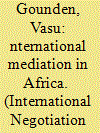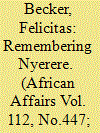| Srl | Item |
| 1 |
ID:
173286


|
|
|
| 2 |
ID:
155705


|
|
|
|
|
| Summary/Abstract |
Although informal and traditionally driven practices of mediation have existed for many generations, institutionalized and African-driven mediation became more important following the end of the Cold War. Mediation initiatives undertaken over the past 25 years, partly as a consequence of the increase in intra-state conflicts on the continent, have resulted in the generation of a deep body of knowledge and the evolution of a community of practitioners. This article examines two of the first post-1990 African-driven mediation processes – the Arusha Peace Process for Burundi and the Inter-Congolese Dialogue (ICD) for the Democratic Republic of the Congo (DRC) – to highlight key lessons that emerged, including the choice of mediator, who to include in the mediation, the impact of regional and international dynamics on the mediation, the importance and challenges of addressing the root causes of the conflict in a mediation process, and the role of non-state actors and Track II diplomacy.
|
|
|
|
|
|
|
|
|
|
|
|
|
|
|
|
| 3 |
ID:
119119


|
|
|
|
|
| Publication |
2013.
|
| Summary/Abstract |
This article examines the changing uses of political rhetoric around the burial of Julius Nyerere in 1999. It argues that the ruling party uses rhetoric as a means of 'soft power', but also documents how this rhetoric, though geared towards legitimizing Nyerere's successors, employed tropes that were rejected by some people and were used by others to critique leaders who were perceived to lack the selfless integrity attributed to Nyerere. The article compares funerary songs by a government-sponsored band, popular at the time of Nyerere's death, with memories of Nyerere in rural areas in the early to mid-2000s. While the image of Nyerere in the funeral songs as a benign family patriarch writ large still persists, it coexists with strongly divergent constructions of Nyerere as an authoritarian ruler or a self-seeking profiteer. Moreover, the 'official', benign Nyerere has been employed not only by government and party faithful, but also by striking workers, opposition politicians, and critical newspapers as a measure of the shortcomings of his successors. The invocation of Nyerere as a paragon of an endangered ideal of virtue in public office indicates widespread anxieties towards a state that often disappoints but occasionally delivers, in unpredictable turns, and the limits of the government's ability to shut down dissent.
|
|
|
|
|
|
|
|
|
|
|
|
|
|
|
|
| 4 |
ID:
185668


|
|
|
|
|
| Summary/Abstract |
For a time, Tanzania enjoyed a reputation for mostly free elections and public debate. But after President John Magufuli was elected in 2015, he introduced measures to stifle the media and tilt the electoral playing field in favor of the longtime ruling party. The turn toward authoritarianism is not due to any one personality or stereotypical “mad dictator,” however (notwithstanding Magufuli’s pandemic denialism, which may have cost him his life). It is part of the legacy of the early postcolonial period and the revered founding president, Julius Nyerere, who set the foundations of one-party rule and wielded the rhetoric of economic nationalism.
|
|
|
|
|
|
|
|
|
|
|
|
|
|
|
|